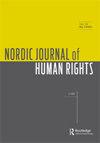迁徙中的土著人民:来自巴西的委内瑞拉土著移民的交叉性隐形和对多元人权的追求
IF 1.2
Q3 POLITICAL SCIENCE
引用次数: 0
摘要
土著移民经常不考虑他们作为土著人民的身份,就好像他们的移民身份在等级上取代了他们的土著身份。近年来,从委内瑞拉到邻国的土著移民人数大幅增加。目前,巴西有几个来自委内瑞拉的土著人民。这项评价性跨学科研究涉及土著和移徙人权保护之间的关系,并考虑到非殖民化的观点。它质疑生活殖民如何影响土著移民的权利,导致他们在交叉领域被忽视,以及非殖民主义的人权观点如何有助于克服这些挑战。它声称,植根于多元宇宙的非殖民化人权观,在土著宇宙观的指导下,可以将人权视为解放的剧本。最终,本文旨在促进对土著移民所面临的交叉压迫的批判性理解,并通过呼吁转向对其人权采取多元方法,说明实现土著移民权利的可能途径以及使其生活现实非殖民化的必要性。这可能为人权议程非殖民化的潜在方向以及拉丁美洲土著移徙者的人权法律和实践提供信息。本文章由计算机程序翻译,如有差异,请以英文原文为准。
Indigenous Peoples on the Move: Intersectional Invisibility and the Quest for Pluriversal Human Rights for Indigenous Migrants from Venezuela in Brazil
ABSTRACT Indigenous migrants are often treated without regard for their status as Indigenous Peoples, as if their migrant status would hierarchically supersede their Indigenous one. The flow of Indigenous migrants from Venezuela to neighboring countries has largely increased over the years. Currently, there are several Indigenous Peoples from Venezuela in Brazil. This evaluative interdisciplinary research addresses the relations between Indigenous and migration human rights protection with consideration for decolonial perspectives. It questions how living coloniality impacts Indigenous migrants' rights, leading to their intersectional invisibility, and how decolonial views on human rights may help overcoming these challenges. It claims that a decolonial perspective on human rights rooted in the pluriverse may situate human rights as emancipatory scripts when led by Indigenous cosmologies. Ultimately, this article aims to contribute to critical understandings on the intersectional oppression faced by Indigenous migrants and, by calling for a shift towards pluriversal approaches to their human rights, illustrate possible paths to the realization of Indigenous migrants' rights and the need to decolonize their lived realities. This may inform potential directions for decolonizing the human rights agenda as well as the law and practice of human rights in the case of Indigenous migrants in Latin America.
求助全文
通过发布文献求助,成功后即可免费获取论文全文。
去求助
来源期刊

Nordic Journal of Human Rights
POLITICAL SCIENCE-
CiteScore
1.00
自引率
25.00%
发文量
29
期刊介绍:
The Nordic Journal of Human Rights is the Nordic countries’ leading forum for analyses, debate and information about human rights. The Journal’s aim is to provide a cutting-edge forum for international academic critique and analysis in the field of human rights. The Journal takes a broad view of human rights, and wishes to publish high quality and cross-disciplinary analyses and comments on the past, current and future status of human rights for profound collective reflection. It was first issued in 1982 and is published by the Norwegian Centre for Human Rights at the University of Oslo in collaboration with Nordic research centres for human rights.
 求助内容:
求助内容: 应助结果提醒方式:
应助结果提醒方式:


